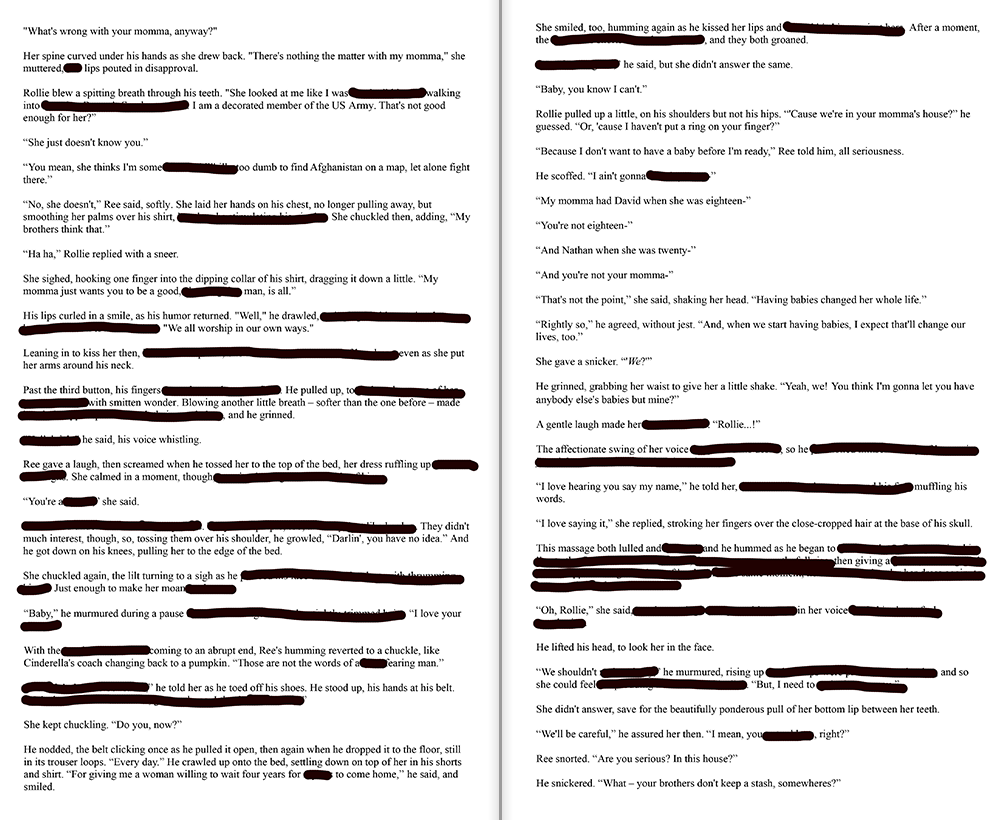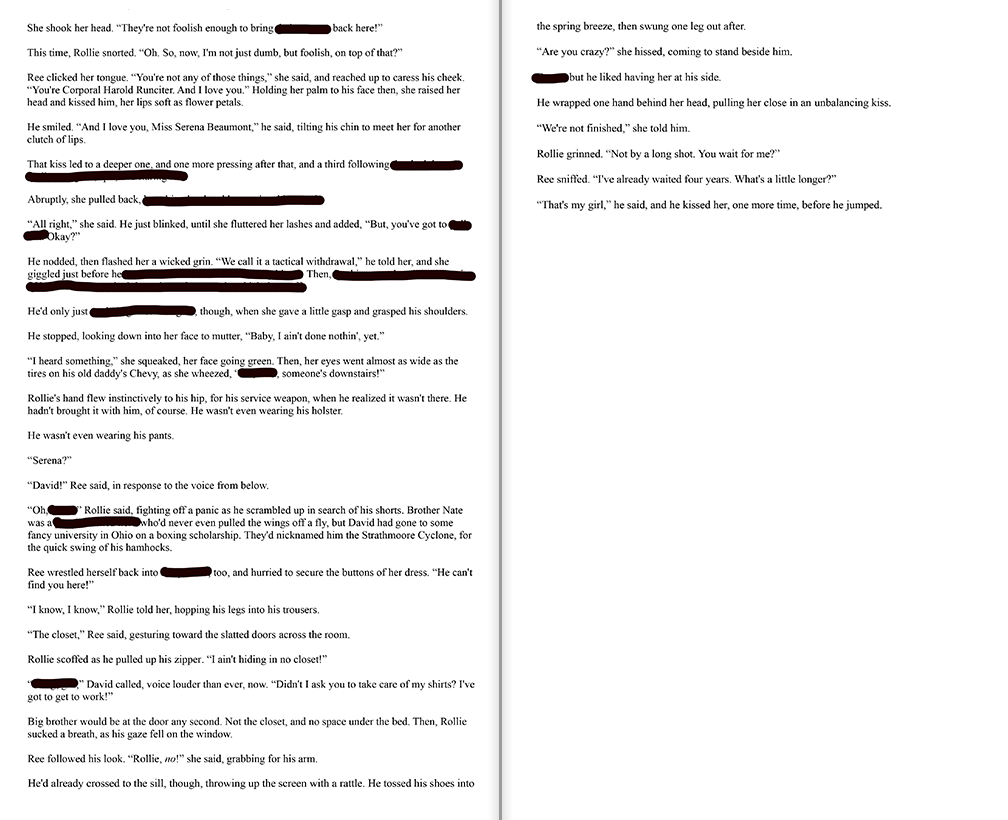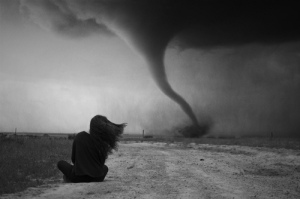by Mayumi-H | May 22, 2013 | Persona 4 Fan Fiction, Process, Short Stories
A few weeks ago, I wrote about a particular Free Write Friday picture prompt (Free Write Fridays from Kellie Elmore). What came from that free write session was about 1600 words of a relationship story, one that flowed so naturally from my fingers, I just couldn’t stop writing it. As I mentioned in that earlier post, what struck me as I wrote those characters was how much of a role their religion played in their dialogue. Their sexuality also featured prominently, which is one of the main reasons why I didn’t post the piece at the time. Because you never know who you might offend.
Generally speaking, offending potential readers is not something I care very much about. It’s my belief an artist should create Art that speaks from the soul, no matter how dark, bright, raunchy, or chaste. Whether the artist can then sell that creation if they so choose is an entirely different debate. But, the Art at its core should be honest. Otherwise, it’s not so much art or even craft, but simply a consumable.
Side note: I’m not saying there’s anything inherently wrong with producing for consumption. Nor am I saying consumables necessarily exclude artistry, or vice versa. I think A Song of Ice and Fire has proven that pretty well. Besides, every one needs to eat, no matter how high-falutin’ their principles.
That said, I recently revisited that piece of free writing because I was curious to look at it with fresh eyes. I wanted to see if it really was as bad as I’d originally thought. Holding a marker, I went over and redacted everything I thought anyone could possibly find offensive in any way. This is what came of that exercise:


If, for some reason, you’re interested in the actual words, click the images for a more legible experience (they’ll open in a new window or tab). The scene itself isn’t important, though. The reason for this exercise – aside from fueling my own personal amusement – was for me to see just how much black there’d be on those pages.
I’m not particularly smart, so I can’t write good mysteries or thrillers. I’ve only ever held a gun once, and never in a conflict, so I’m not qualified to write a big war epic. But, I understand people, and the everyday conflicts that can arise from personality and heritage clashes. I know love, too, because I experience it in my life every day. And I like sex, because…well, who doesn’t?
I don’t pull many punches when it comes to my stories. I try my best to warn folks ahead of time if a story contains questionable or mature material, but I also believe any individual should be able to decide for themselves if they want to continue or not. But, I’m writing these for me, first, and those topics are the ones I personally enjoy exploring. If they need to be redacted later, to fit someone else’s idea of what’s appropriate or salable, well, that’s life.
Have you ever redacted or edited something you’d written to fit someone else’s sensitivities? Why did you do it? Or, if you didn’t do it, why not?
by Mayumi-H | Apr 17, 2013 | Persona 4 Fan Fiction, Process
Last Friday’s Free Write Friday prompt from Kellie Elmore was the below photo:
What struck me about the photo was not so much the twister itself or the girl in the foreground, but the way people’s lives can often feel like they’re caught in a storm. And, how lonely that girl’s silhouette is. From nowhere – truly, nowhere, as I am, at the moment, working on three very different stories with nothing to do with the prompt – a scene popped into my head, bright as a bolt of lightning: a young man and young woman hiding together, to be together. It was very conversational but still mostly descriptive of their clandestine affair, which is why I chose not to submit it to the prompt.
The odd part about this story snippet was not the flash of inspiring imagery, or the way these characters felt like familiar ones to me, or even the main conflict fashioned by my brain for why the two of them should meet in secret. Rather, it was the smaller conflict of their histories. Specifically, how religion related to their interaction.
If you think violence or sex are hot-button issues, they’re nothing compared to religion. I don’t even feel very comfortable talking about it, here, because… I don’t know. Because I’m scared, I guess.
Not many readers take issue with crime or violence in stories. It’s part of real life, after all. Sex is a slightly touchier subject, probably because it’s associated with prurience or deviance (which is not always the case, but I think I’ve belabored that point already). Faith, though, is unique to each individual person. Nonetheless, it often feels like we’re treated only to religious extremes, in fiction: fanatics like Margaret White (the mom in Stephen King’s Carrie) or the Republic of Gilead in Margaret Atwood’s The Handmaid’s Tale. Given such examples, it’s hardly a wonder that religion often does not play a role in many stories, at least, not a prominent one.
So, why did I take a religious angle for that scene? Mostly, it came from the dialogue. Evidence of their faith sprang, fully formed, from these characters’ mouths. They didn’t preach to me or to each other. They simply were who they were: a mid-western society girl and her working-class, ex-Army boyfriend. Not even their different racial backgrounds featured so prominently in their characterizations as their religious upbringing.
It was weird. Because my own faith is very personal, and I’d never inject those feelings into a story. Not consciously, any way. Sure, religion has had its part. I’ve examined Shinto, but only for the burial rituals and a wedding ceremony; two of my earlier protagonists were Catholic versus Protestant just for a few low-level jabs; I’ve looked at Anglicanism in a broader sense from a social perspective, mostly to counterbalance the dourness of one of my scientific empiricists. But having characters mouth off to each other about church and faith? That was new.

Shrine to World Religions, by Helen (Flickr: Shrine To World Religions) [CC-BY-2.0], via Wikimedia Commons
Have you ever had your characters take you by surprise, about their personal agendas or perspectives?
by Mayumi-H | Apr 10, 2013 | Process
Knowing how to write dialogue is an important tool for a writer. Even more important, though, I’d wager, is being able to write believable dialogue. Countless articles and books have been written on the subject, but the same advice always crops up: Pay attention and listen.

By David Benbennick [GFDL (http://www.gnu.org/copyleft/fdl.html), CC-BY-SA-3.0 or CC-BY-SA-2.0], via Wikimedia Commons
What we hear in daily conversation doesn’t always work for the written word, of course. Slang, for example, can be problematic to explain to someone unfamiliar with its roots, just as dialect speech can be nightmarish for a reader to slog through. (Joseph, I’m looking at you.) Generally speaking, though, even these examples don’t have to be make-or-break issues with dialogue. If your characters are strong enough in their own voices, the little tweaks and twinges shouldn’t matter so much. Quirky speech patterns can even help identify characters to the audience, often a good thing.
But, those are generalities. I’m talking about specifics, here.
The other day, while sitting with some friends, we were talking about the transience and flow of language across generations. The discussion went pretty deep as we argued our opinions and went back and forth with pros and cons to each perspective. Then, from nowhere, one friend piped up, “I’m gonna bring back ‘rad’ to the common lexicon.”
I burst out laughing…and I knew I’d have to use it in a story.
My friends learned a long time ago that almost nothing said in my presence is sacred. Not to say I can’t keep a secret, because I can do that. But, the words themselves become free to my pen, the second they’ve left anyone’s mouth. I don’t make any excuses for myself in this regard. If I hear it with my ears, it instantly becomes reality – and believable – to me. And, that makes for great dialogue.
Some of my favorite conversations in real life I’ve decided to preserve in my stories. Many of them were simply jotted down in 100-word shorts or random snippets tucked into the pages of a notebook, for use – or not – at some later date. But, others have found their way actively woven into the larger tales, adding a sense of deeper realism and stronger truth to the story that may not have been so deep or so strong without them.
Other writers (ones better than me) say to listen to the world and words around you. Pay attention to the details. Keep your eyes and ears open. And, that inspiration can be sitting right in front of you. Or just to the left, spouting pearls of beautiful dialogue between peanuts and sips of beer.
Some among you may consider my technique of stealing borrowing words from such conversations cheating at my art. As for me, I prefer to consider it art imitating life. For real.
How do you create believable dialogue? Have you ever used real conversations in your stories? Were you able to read Joseph’s dialogue from Wuthering Heights without looking at a translation sheet?
by Mayumi-H | Apr 6, 2013 | Fearless, Short Stories
This week, Lillie McFerrin’s prompt for her Five Sentence Fiction challenge is “WORDS.”
I went a few different ways with this prompt, at first…though, my initial flash fiction idea – while based on a true story – pushed the vulgarity a bit too much than I like to do for a public challenge. So, this little vignette, taken from the early days of Fearless:

By AstroHurricane001 at en.wikipedia [Public domain], via Wikimedia Commons
“The loss of artful conversation”
Stretched upon the sand, beneath a canopy of stars, with the rhythm of the rolling current nearby, the lads often turned reflective.
“I think,” Neville mused softly, “with all this technology, and the culture of instant messaging, mankind’s lost the skill of artful conversation, like the poetry that used to exist in the days of Shakespeare, or Milton: what happened to that, where’s all that gone?”
With his head laid in the pillow of Amber’s lap and soothed by both the sound of waves and the gentle drift of her fingers through his hair, Ross hummed, and murmured, “There might be something to that. But,” he added, his gaze finding Amber’s as he opened his eyes again, “for some things, I don’t think you need conversation.”
That settled the lads for a long minute, until Niall sniffed, and declared:
“I’m gonna bring back ‘rad.’”
I’ve spoken on this blog about making art with words before, so I don’t think it needs repeating. I do often wonder, as Neville does, if the immediacy of communication hasn’t taken away some power of words, though. When was the last time we made efforts to write real letters, rather than emails, or instant messages on a phone?
Or, perhaps, I’m just waxing nostalgic, and that old power of lyricism in dialogue has been replaced by something else. What do you think? How do WORDS speak to you?
by Mayumi-H | Mar 2, 2013 | Fearless
I’ve had a long, tiring week of other people telling me what to do and how to do it, so I decided to make a fiction post strictly for myself. Luckily, Kellie Elmore’s Free Write Friday offered me a prompt that kept me from going completely off the rails. As it is, I’ve adhered only marginally to the confines of the prompt, which happens to be “Serendipity.”
Mature situations described below. Nothing graphic, but you should probably skip it if it’s not your cup of tea.
“Again, for the First Time”

Stehendes Liebespaar, Otto Mueller [public domain image]
The warmth and comfort of his embrace soothed – the easy rhythm of his gentle snoring even more so – but it was nearly tea, and her belly fluttered a bit at the idea of doing something nice for him. So, easing out from beneath his arm, she scooted to the side of the bed and clambered from the blankets, reaching for her clothes.She dressed with quiet speed, but, turning back toward the bed while straightening her dress, she paused, to drink in the sight of him.
Even tousled and dozing, he was fine, a blond, bronzed demigod built lean, long, smooth, and strong. Just the thought of touching him – of him touching her – made her blood pound once more.
Maybe he was wicked, as Sam had warned. But, she’d never shied from risk. And maybe he wasn’t as refined as the boys who used to try to ply her with their stylish clothes and fancy cars. But, they’d never made her come.
Her nerves tingled at the memory, not even an hour old. He’d done it once. He could do it again. And again, and again, and again…!
She closed her eyes, but not looking didn’t stop her from remembering: the smell of the sea in his hair, the taste of it on his lips, the fine scratch of grains against her naked skin where their bodies came together.
When she’d first set foot in this tiny, unassuming village, she’d never dreamed she’d be standing here, flushed and eager for the touch of a man so unlike her norm. She’d wanted only simplicity after watching Mum wither, a fresh start someplace new. Maybe a pleasant distraction, if one presented itself. But not this stirring, this bubbling, this tremendous burst of feeling in her heart that threatened to turn her small and vulnerable again. Next, she’d be telling this beautiful beast she loved him –
Her belly quivered anew, and she opened her eyes. Her cheeks burned as she looked at him again.
Love.
Pulling her lip between her teeth, she stifled a foolish, girlish giggle.
But first, tea.
Coming off the tips of my fingers, this little moment is unrefined and mostly stream of consciousness. But, isn’t that what free writing is supposed to be all about? If not good, at least unfettered? I hope so. Because I don’t even know what good writing looks like, from me, any more.
I’ve spent so long in Ross’s head, examining one of the story’s moments from Amber’s point of view was a treat. She’s girly and a-flutter and I don’t care that she’s not breaking stereotypes or carrying a banner for the feminist revolution. I like her the way she is. Maybe because she’s me, and I’m tired of the sisterhood getting up in my face for wearing dresses that cling and heels that make my calves pop and enjoying the sensation of my husband’s hands on me in a playful grope.
I should probably end with a question, as I’m supposed to do with a blog post, leading you to comment and engage. But I wrote this for me and I only posted it to keep to my schedule. So, instead, I’ll end with a hope: that you are well, free of the pressures of work and rules, and able to indulge unhindered – just a bit – in your own private universe, at least for a little while.








Recent Comments